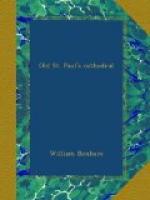[Footnote 5: It stood where the Peel statue now is, at the top of Cheapside.]
* * * * *
CHAPTER V.
HISTORICAL MEMORIES OF THE TUDOR PERIOD.
Good Dean Colet—Accession of Henry VIII.—Papal Favour —Cardinal Wolsey at St. Paul’s—Bishop Fisher’s Preaching at Paul’s Cross—Fall of Wolsey—Alienation of the King from the Pope—The English Bible in the Cathedral—Edward VI. —Ridley’s Strong Protest against the Images—Progress of the Reformed Doctrines—Somerset’s Evil Deeds—Destruction of the Cloisters—Re-establishment of the Roman Mass under Mary —Cardinal Pole at St. Paul’s—The Lord Mayor’s Proclamation —Alienation of the Nation from Romanism—Death of Mary and Accession of Elizabeth—The Reformed Liturgy Restored—Growth of Puritanism—Destruction of the Steeple by Lightning —Continued Irreverence—Retrospect, the Tudor Monuments.
It seems fitting that we should open the chapter of a new era in the history of St. Paul’s with the name of its most famous Dean, a great, wise, good man. His name was John Colet. He was born in London, in the year 1466, within three months of his famous friend, Erasmus. His father, Sir Henry Colet, was twice Lord Mayor, one of the richest members of the Mercers’ Company. John, who was his eldest son, had ten brothers and eleven sisters, all by the same mother, who outlived the last of them. The young man was presented to livings (it was no unusual thing then) before he took Orders, and gave himself to study, both mathematical and classical, and in his zeal for learning travelled much abroad, where he saw much of ecclesiastical life, which startled him greatly. Returning, at length, to England, he was ordained at Christmas, 1497, went to Oxford, and began to lecture with great power on the Epistle to the Romans. It must be remembered that this was the epoch when the fall of Constantinople had driven the Greek scholars westward, the epoch of the revival of “the new learning” in Europe, the discrediting of the old scholastic philosophy which was now worn out and ready to vanish away. Colet stands before us then as the representative of the new learning in England, and as keen to reform the abuses in the Church which were terrifying all earnest and thoughtful men. He carried on his lectures with such energy that his lecture-room was crowded, the most distinguished tutors there being among his audience. And one day there came the great Erasmus, who had heard of him, and from the day of their first meeting they were fast friends for life. In 1504, Henry VII. made Colet Dean of St. Paul’s, and he showed at once that he had lost none of his zeal. He carried on his lectures in the cathedral and preached constantly,




